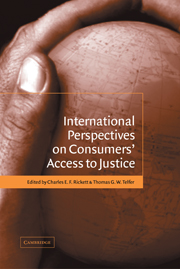Book contents
- Frontmatter
- Contents
- List of contributors
- Preface
- Table of cases
- Table of statutes
- 1 Consumers' access to justice: an introduction
- Part I Perspectives on consumers' access to justice
- 2 Consumer redress and access to justice
- 3 Consumer access to justice in common law countries: a survey of the issues from a law and economics perspective
- 4 Rethinking consumer protection policy
- Part II Issues in contract and tort
- Part III Services and the consumer
- Part IV Consumer bankruptcy law
- Part V Procedure and process issues
- Part VI Conflict of laws issues
- Index
2 - Consumer redress and access to justice
from Part I - Perspectives on consumers' access to justice
Published online by Cambridge University Press: 11 July 2009
- Frontmatter
- Contents
- List of contributors
- Preface
- Table of cases
- Table of statutes
- 1 Consumers' access to justice: an introduction
- Part I Perspectives on consumers' access to justice
- 2 Consumer redress and access to justice
- 3 Consumer access to justice in common law countries: a survey of the issues from a law and economics perspective
- 4 Rethinking consumer protection policy
- Part II Issues in contract and tort
- Part III Services and the consumer
- Part IV Consumer bankruptcy law
- Part V Procedure and process issues
- Part VI Conflict of laws issues
- Index
Summary
Introduction
The concept of access to justice has become an integral part of policy discourse in many countries. The attractiveness of its symbolism has made it a convenient wrapper for many proposed changes in court procedures and legal services. Access to justice is intimately connected with the rise of consumer protection and it is embedded in the United Nations Guidelines for Consumer Protection, which provide:
Governments should establish or maintain legal and/or administrative measures to enable consumers or, as appropriate, relevant organizations to obtain redress through formal or informal procedures that are expeditious, fair, inexpensive and accessible. Such procedures should take particular account of the needs of low-income consumers.
Governments should also ‘encourage enterprises to resolve consumer disputes in a fair, expeditious and informal manner’ and ‘information on available redress and other dispute-resolving procedures should be made available to consumers’.
In this essay I discuss two topics in relation to consumer redress and access to justice. My primary topic concerns the distributive impact of individualised complaint and redress procedures. I explore the question whether individualised redress procedures have a distributional tilt against lower-income and disadvantaged groups. I approach this question through an analysis of socio-legal research on three topics: consumer responses to problems with goods and services; the role of intermediaries in consumer disputes; and research on small claims courts. I then pose some questions raised by this research for thinking about reforms to the legal system and regulation of consumer markets.
- Type
- Chapter
- Information
- Publisher: Cambridge University PressPrint publication year: 2003
- 9
- Cited by



